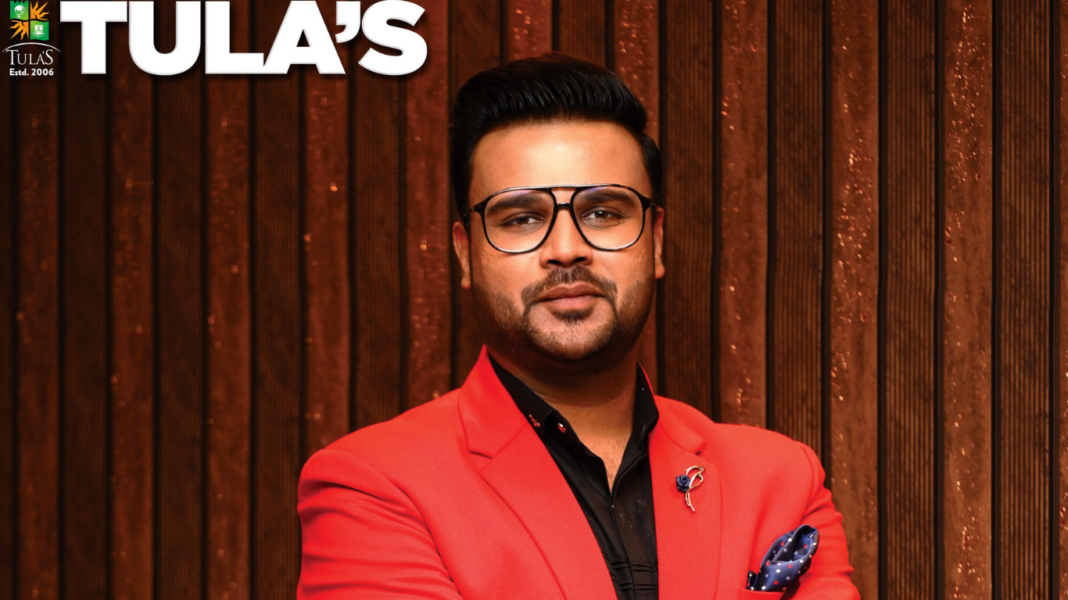
A Diverse The Kind of Leader for a New India
Raunak Jain offers a vital and refreshing change in an era once educational institutions are frequently evaluated by numbers, positions, and extravagant buildings. Jain goes beyond running learning institutions as the Vice Chairman of Tula’s International School and Tula’s Institute in Dehradun. He is transforming the method by which education works in India. He encourages to implement systems that incorporate academic achievement with empathetic thinking, morality, and expansion.
Local Roots, Global Knowledge
Jain went to the Royal Holloway College of London, where he studied International Business. Then he possibly concentrated for an enterprise internationally. Instead, he proceeded once more to India not merely because he wore to but rather given that he wanted to. His guiding belief, “India has sufficient aptitude; language proficiency is lacking locations which permit talent to rise,” is now the very heart of Tula’s. Indian publications such as Forbes and India Today felicitated the school not merely for its academic successes but also for its atmosphere and sense of motive under the president’s direction.
Jain believes that educational institutions ought to emphasize that individuals are able to grow. His return to India was a sign of a deeper calling: to create a way of learning that gives young people power through prospects and the right environment. Jain believes that education should help people grow, the entire nation move upwards, and contribute to humanity throughout its entirety.
A vision that passes beyond the syllabus
What establishes Raunak Jain separate from others is that he can see things from a global point of view while still holding on to strong Indian values. At Tula’s, he promotes a learning environment where students are encouraged to ask questions, try new things, and come up with new ideas. His famous saying, “Together we rise, together we touch the skies,” is not a marketing phrase. This is the school’s main idea.
Jain managers lead by active presence rather than remote command, in contrast to typical administrators. He works with faculty, visits classrooms, wanders through the classrooms, and attends student shows. He considers genuine communication the cornerstone of good leadership. By listening, observing, and reacting, he fosters accountability and trust across the company’s hierarchy.
The Jain is implementing open-door practices which motivate staff and students to debate ideas, discuss complications, and take part in school governance. Tula’s has become a vibrant community where learning takes place through discussions and encounters as well as books thanks to this democratic method.
Holistic Education for a Complete Life
Textbooks and test scores are not the only aspects of education for Jain people. According to him, it ought to equip youth to lead fulfilling lives and make responsible contributions. For this reason, he has developed a holistic approach to education at Tula’s that places equal emphasis on leadership, entrepreneurship, sustainability, critical thinking, the arts, and athletics.
Jain has championed sports in education as the President of the Uttarakhand Crossbow Shooting and Roller Skating Associations and a Permanent Member of the Uttarakhand Cricket Association (all of which collaborates with the BCCI). Sports are important assets for strengthening character, resilient qualities, and confidence at Tula’s; they are not extracurricular pursuits. Students are succeeding in both school and sports under his tuition; many of them go on to represent their state and country.
He additionally implemented leadership boot camps, nature-based learning campaigns, and multidisciplinary projects. By cultivating intellect, body, and soul, these experiences guarantee that Tula’s graduates are not only informed but also sensible, grounded, and socially conscious.
Achievements That Speak of Impact, Not Ego
Though Raunak Jain has been widely honored, he wears his success lightly. Some of his accolades include:
- Entrepreneur of the Year 2021 – CEO Review
- Icon of the Year 2021 & 2022 – Discover Uttarakhand Magazine
- Education Stalwart 2019 & 2021 – Education Today
- Swarnim Award 2023 – Dharma Creations
- Featured in Forbes India’s Youngest School Directors List
Jain, nonetheless, hardly ever brings them up. Instead, he emphasizes on making a lasting impression rather than winning accolades. “He’s the kind of leader who walks beside you until you realize you’ve grown—he doesn’t ask you to follow him,” one faculty member said.
However his demeanor shouldn’t be interpreted as a lack of drive. Jain is always planning ahead, creating new projects, establishing strategic partnerships, and making technological investments that will shape classrooms of the future.
Asking the Right Question: Who Do You Want to Be?
Jain proposes a more profound and significant query in a nation where adolescents are all too frequently instructed what they ought to become: “Who do you want to be?” His leadership is characterized by encouragement, ambition, and empathy. He encourages pupils to have big dreams, make errors without fear, and get back up stronger every time. He believes that a lack of connection, rather than a lack of quality, is the true issue facing Indian education.
The goal of every project he launches is to reestablish that link, whether it is through curriculum redesign, outreach initiatives, sports investment, or scholarships. According to Jain, education should not only educate students for the present but also for leadership in an unimagined future.
In order to make sure that learning never ends, he is also funding parent engagement forums, teacher training programs, and alumni mentorship networks..
A Leader for Tomorrow’s India
Raunak Jain symbolizes a new kind of Indian leader who is culturally aware, emotionally astute, and educated worldwide. For the average reader who happens to be perusing these pages in midair, his path might appear to be one of achievement. On a deeper level, however, it is a tale of service and conviction.
According to Jain’s vision of India, schools would not just generate professionals but also people who are brave, kind, and able to create a better future. That is his real legacy in progress, more so than all of his honors and accolades.
His narrative serves as a reminder that the most potent revolutions are frequently silent, motivated by purpose rather than commotion.































